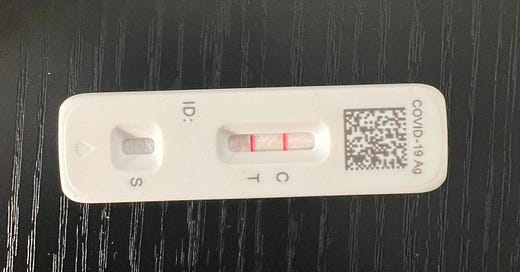You Need to Stop Asking Me How I Got Covid
How a virus sparked a new form of superiority complex.
At my age, only a positive pregnancy test would be more disturbing than the results above.
Before these twin pink harbingers of quarantine made their unwelcome appearance, I had every intention of writing about something else this week—specifically, the time I lost a knife fight in Paris. But life has thrown me a series of curveballs lately, and with this week’s pitch arriving in the form of Covid, I’m instead writing a short screed from the prone position in bed.
This is the third time I’ve had Covid, the first being in 2021, about three months after having the two shots we were told would prevent us from getting infected. It’s definitely been tougher this time, though far from the most discomfort I’ve ever experienced. That distinction would go to a particularly heinous bout of mono I had at seventeen, which made my throat feel like I was drinking a cocktail of boric acid and thumbtacks every time I swallowed.
Yet Covid, as I’ve come to realize, is unlike any other malady I’ve encountered. It's not just a virus; it's a strategist on a weekend bender. A master tactician with a meth habit. A cold, calculating general poking and prodding your body’s defenses for weakness, who transitions into a gacked-up warlord once a soft spot is found.
And then it moves. Boy, does it like to move.
One moment, it’s in your chest, making every breath feel like a workout. Then, just when you think you’re getting better, it pulls back, regroups, and launches a fresh assault somewhere else—your head, your stomach, your sinuses—your fucking teeth—all the while making you feel like you’ve been beaten with a bat.
But more fascinating to me than how Covid affects its victims is how it affects everyone else.
Historically, Americans have had a strange relationship with illnesses. Some elicit sympathy, others, indifference, and some come with a big dose of judgment. To call it paradoxical would be kind. Hypocritical would be more accurate.
In the late '80s, I lost a friend, client, or co-worker to AIDS every other week, yet most of the public—on both sides of the aisle—paid no attention to this "gay disease." It wasn't until a straight star athlete revealed his diagnosis that apathy finally turned to empathy.
These days, nobody feels bad for the 30-year, three-pack-a-day smoker who develops lung cancer. But for the diabetic who sucks down a 900-calorie Starbucks Sugar Sludge every morning, here, have some free insulin and Ozempic.
Skin cancer from too much time in the sun is a shame (you should have known better), but esophageal cancer from too much booze is a tragedy (everyone drinks).
And once again, this is where Covid is unique.
When you tell someone you’ve got Covid, the first question isn’t “How are you feeling?” or “Do you need anything?” It’s “How did you get it?” or “Where do you think you caught it?”
No one asks this when you mention you have a cold or the flu. Nobody requests an epidemiological rundown when you get a sinus infection or strep throat.
And with their curiosity comes an ever-so-slight sense of superiority, the questioner tacitly implying, “What did you do wrong?”
These folks are suffering from a hangover of sorts. The intoxicant in this case? Magical thinking. Thinking that if we followed the rules and did what we were told we could somehow hide from a virus.
A kind of thinking that went way beyond best practices and into the realm of absurdity—and hypocrisy.
Remember how we mandated that people stay six-feet apart and imposed arbitrary occupancy rules on businesses, but fined lone surfers, banned unnecessary walking, dumped sand in open-air skate parks, and arrested parents who had the nerve to play catch with their kid in an empty park.
Remember how we required masks at restaurants until you sat down because, apparently, viruses respect table manners? And, of course, you had to wear them on planes as well—at least until the drink cart came around.
The virus must have been just as confused as we were.
And today, for those who loved leveraging the tiny bit of power and superiority that being a pandemic rule-follower allowed them, a new Covid diagnosis is a chance to bring out their inner HOA president and relive a slice of their glory days.
There was a time when we were told that Covid would change everything. That things would never be the same. How movie theaters, self-serve soda machines, and buffets would be a thing of the past. That offices would die, cities would hollow out, and human touch would become taboo.
And yet, here we are, a few years later, and what’s actually changed?
Offices are buzzing again, cities are alive, and handshakes and hugs are stronger than ever. The only thing that’s stuck is this bizarre fixation on where one caught Covid.
In any case, here I am, in bed, fighting off this sneaky virus. And no, I don’t know how I got it.
So stop asking me.






Amen!
Hoping for your swift recovery.
I was working in tight quarters for 30 days in June with 15 guys in an office trailer, remote construction site. We all got the worst sickness I've ever had. Like razor blades in the throat, chills, fever, the shits, you name it. The amount of phlegm hacked up in that office was legendary, and the coughing and sneezing fits were distracting to say the least. Work production dropped off dramatically as different guys took a day off to sit on the shitter or just lie there back at the hotel room.
None of us even bothered to get tested. Canadian construction workers are over it.